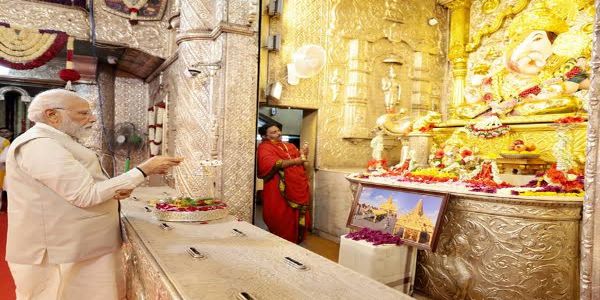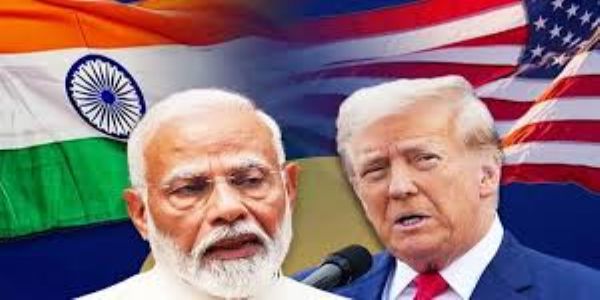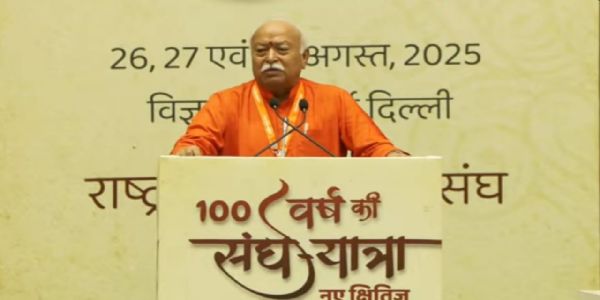
New Delhi, August 25 (HS):India and Fiji on Monday reaffirmed their long-standing friendship and elevated their partnership to new heights during the first official visit of Fijian Prime Minister Sitiveni Rabuka to New Delhi in his current tenure. The two Prime Ministers — Shri Narendra Modi and Mr. Rabuka — held expansive talks covering security, trade, health, climate action, culture, and people-to-people ties, signing multiple agreements that will significantly expand bilateral cooperation.
Rabuka arrived in New Delhi on August 24 for a three-day visit (August 24–26), accompanied by his spouse, Fiji’s Health Minister Antonio Lalabalavu, and a senior delegation of Fijian officials. The visit, laden with symbolism and strategic outcomes, comes against the backdrop of India’s intensified engagement with the Pacific under its Act East Policy and the Forum for India-Pacific Islands Cooperation (FIPIC).
Strengthening Historic Links and Shared Heritage
Welcoming Rabuka, Prime Minister Modi underlined the centuries-old ties built on a shared cultural and linguistic heritage, dating back to the arrival of over 60,000 Girmitiyas — Indian indentured labourers — to Fiji between 1879 and 1916. The two leaders highlighted the growing role of this diaspora in shaping Fiji’s multicultural identity and reaffirmed commitment to celebrating shared traditions like Hindi language promotion and joint cultural events. A Hindi-Sanskrit teacher is being deputed to the University of Fiji, while Fiji will also host an International Geeta Mahotsav in 2025 alongside festivities in India.
A Joint Push on Global Security and Counterterrorism
In a strong political message, both leaders condemned the terrorist attack in Pahalgam, which claimed 26 innocent lives, and pledged zero tolerance against terrorism. They vowed to intensify joint capacity building against radicalisation, terror financing, emerging technologies used for extremist purposes, and transnational organized crime. Both countries will work together within the United Nations and multilateral fora to strengthen the global counter-terrorism framework.
Climate Action, Renewable Energy and the ‘Blue Pacific’ Vision
Echoing their common vision for sustainability, Prime Minister Modi and Prime Minister Rabuka pledged deeper cooperation under India’s Mission LiFE—Lifestyle for Environment—alongside Fiji’s 2050 Strategy for the Blue Pacific Continent. Fiji’s active participation in global platforms such as the International Solar Alliance (ISA), Coalition for Disaster Resilient Infrastructure (CDRI), and Global Biofuels Alliance (GBA) was hailed as crucial to regional climate efforts.
India will help establish an ISA STAR-Centre at Fiji National University, scale up solar capacity through a Country Partnership Framework, and provide extensive technical assistance under CDRI. Both leaders emphasized biofuels as a secure renewable alternative, pledging sustained cooperation to advance rural livelihoods and reduce carbon emissions.
Healthcare: India to Build Fiji’s Largest Super Specialty Hospital
Healthcare cooperation stood out as a flagship achievement of the visit. A Memorandum of Understanding was signed to construct a 100-bedded Super Specialty Hospital in Suva — the largest project funded by India under its Pacific Grant-in-Aid Programme.
Other steps include:
-Recognizing Indian pharmacopoeia standards in Fiji.
-Establishing Jan Aushadhi Kendras (generic medicine outlets) in Fiji to ensure affordable healthcare.
-Incorporating e-Sanjeevani telemedicine services to link Indian doctors with Fijian hospitals.
-A second Jaipur Foot Camp to provide artificial limbs, and tertiary healthcare for up to 10 Fijians in Indian hospitals under the Heal in India scheme.
-Boosting Defence and Maritime Security
Marking a new chapter, the two sides deepened defence ties, prioritizing regional peace and maritime stability. With the establishment of a Defence Wing in the Indian High Commission in Suva and a Cyber Security Training Cell in Fiji, New Delhi pledged capacity building for Fiji’s armed forces and assistance in securing its vast maritime Exclusive Economic Zone (EEZ).
India will gift two ambulances to the Republic of Fiji Military Forces, step up cooperation in UN Peacekeeping, military medicine, white-shipping information exchange, and disaster relief. Significantly, an Indian Naval Ship will soon undertake a port call in Fiji waters, boosting interoperability in the Indo-Pacific.
Trade, Agriculture, Technology and Development Partnership
The two leaders emphasised that bilateral trade potential remains largely untapped. Modi welcomed Fiji’s decision to grant market access to Indian ghee and signed several trade and capacity-building pacts, including:
-Fiji Development Bank : NABARD MoU on rural finance and inclusion.
-BIS :Fiji Standards Authority MoU on cooperation in standardization.
-NIELIT :Pacific Polytechnic agreement on human capacity building and digital skilling.
-CII : FCEF MoU on business and industry collaboration.
-HLL Lifecare agreement to supply medicines under Jan Aushadhi.
Supporting Fiji’s farming resilience,PM Modi also announced:
-Gifting of 12 agricultural drones and two soil-testing mobile labs.
-Supply of five metric tonnes of high-quality cowpea seeds.
-Posting of an Indian agricultural expert (under ITEC) at Fiji Sugar Corporation for training and research.
-Sports, Culture and People-to-People Connections
Fiji’s growing love for cricket and India’s growing appreciation for rugby brought sports diplomacy into focus. Responding to Fiji’s request, India will depute a cricket coach to foster grassroots talent in Fiji.
The leaders also endorsed migration and mobility initiatives to facilitate the movement of professionals and students, while plans for parliamentary exchanges and a visit of the Great Council of Chiefs (GCC) from Fiji to India were finalized.
Shared Voice in the Global South
Reflecting the rising influence of the Global South, Modi and Rabuka vowed to deepen cooperation under South-South frameworks. Fiji reaffirmed support for India’s permanent seat in a reformed UN Security Council and endorsed its candidacy for UNSC non-permanent membership (2028–29).
Both leaders praised the Voice of Global South Summits initiated by India and welcomed Fiji's active role. Modi also invited Fiji into India’s Indo-Pacific Oceans Initiative (IPOI), while Rabuka underscored his vision of the “Ocean of Peace”—a doctrine focused on harmony, sustainability, and maritime well-being in the Pacific.
Symbol of Enduring Friendship
As a gesture of reciprocity, Prime Minister Modi appreciated Fiji’s land allocation for a new Indian Chancery-cum-Cultural Centre in Suva, while acknowledging India’s earlier land allocation in New Delhi for Fiji’s High Commission.
At the close of talks, Prime Minister Rabuka extended a warm invitation to Modi to visit Fiji, framing the visit as not only a diplomatic milestone but a renewal of fraternity under the Fijian ethos of “Veilomani Dosti”—friendship marked by love, respect, and community.
---------------
Hindusthan Samachar / Jun Sarkar








